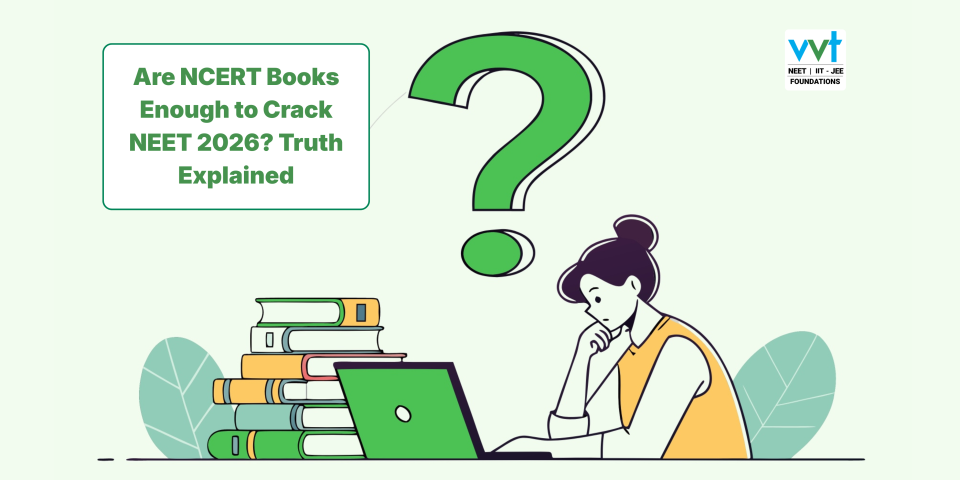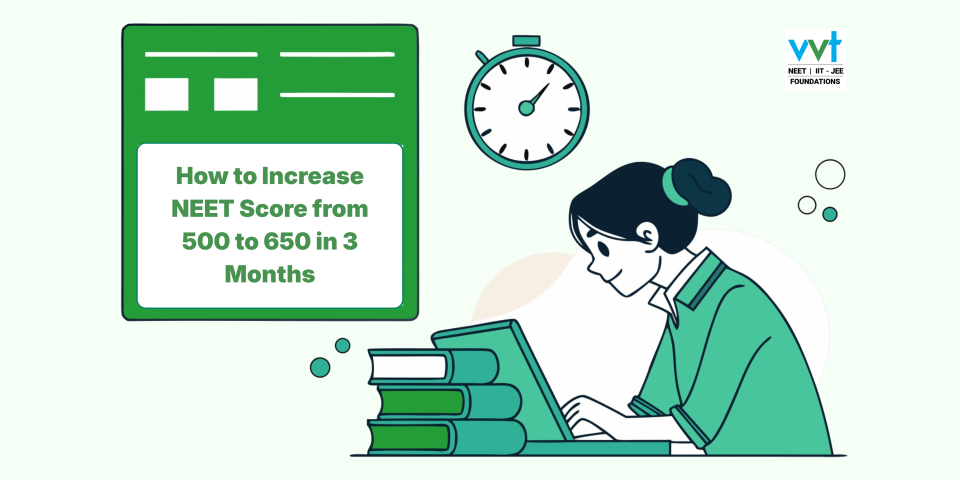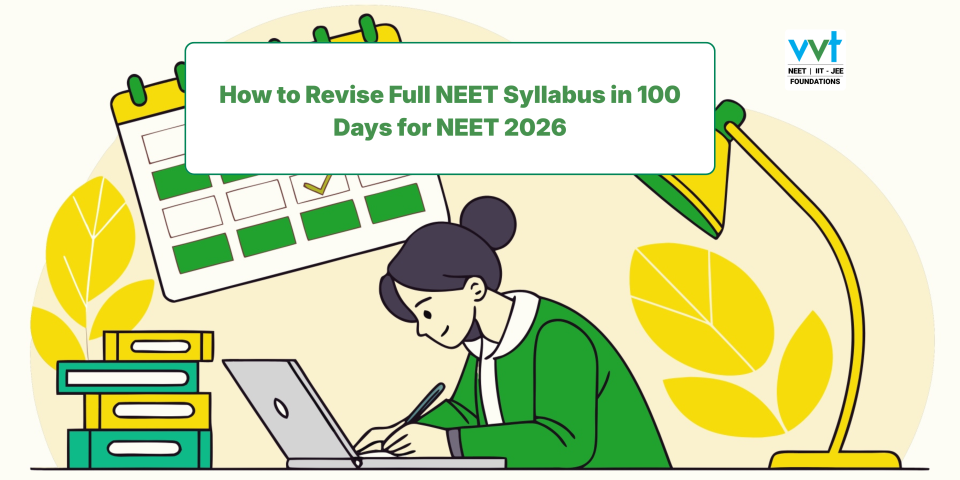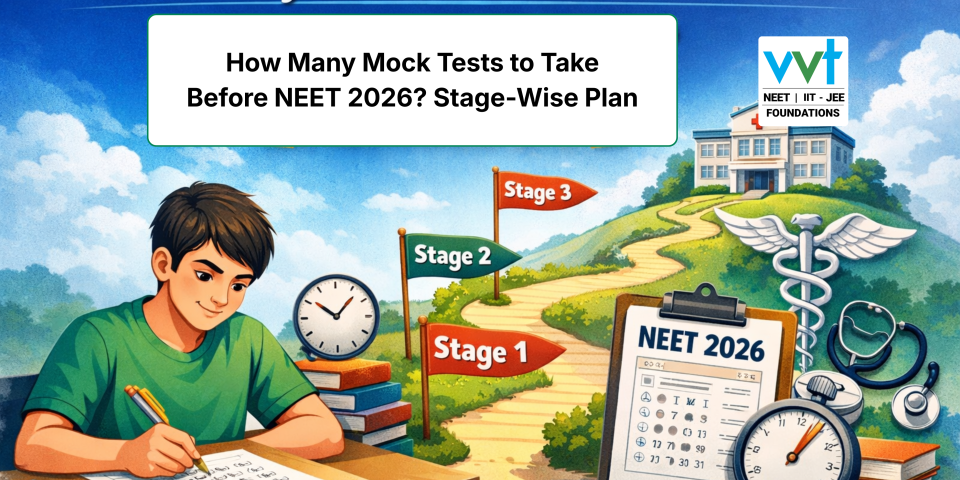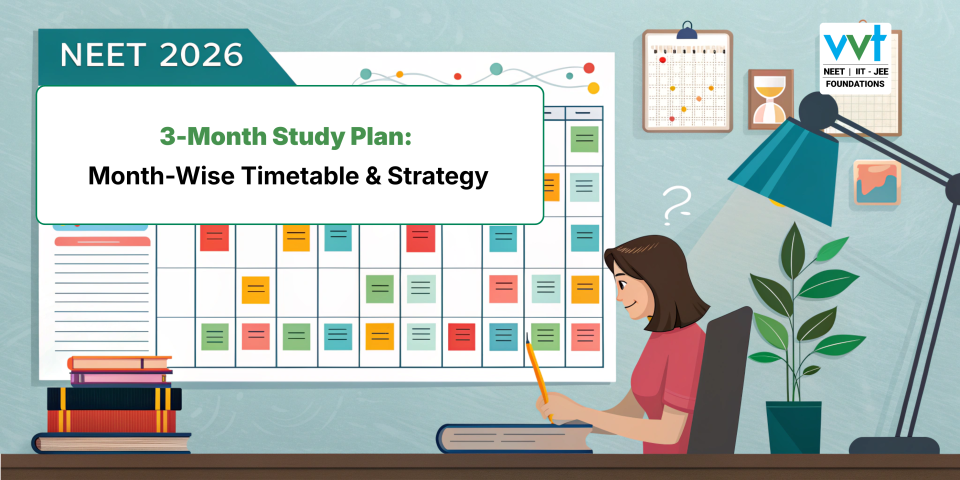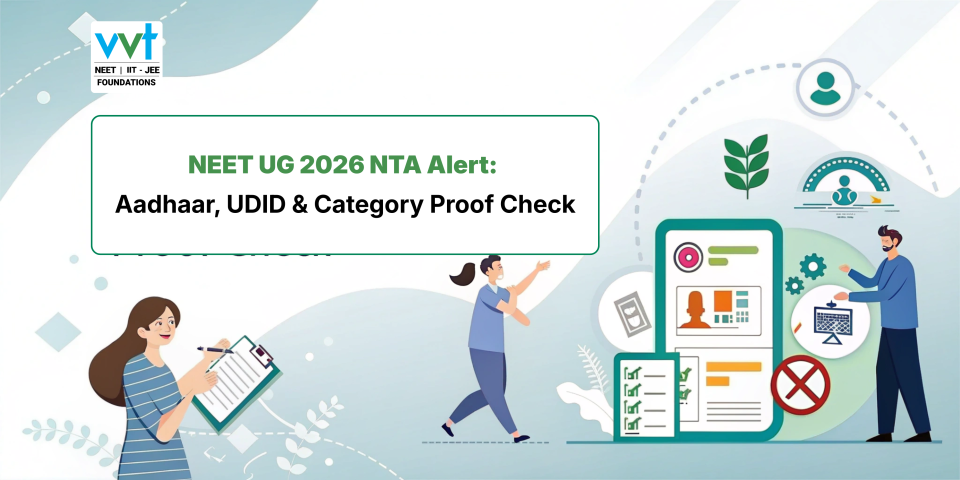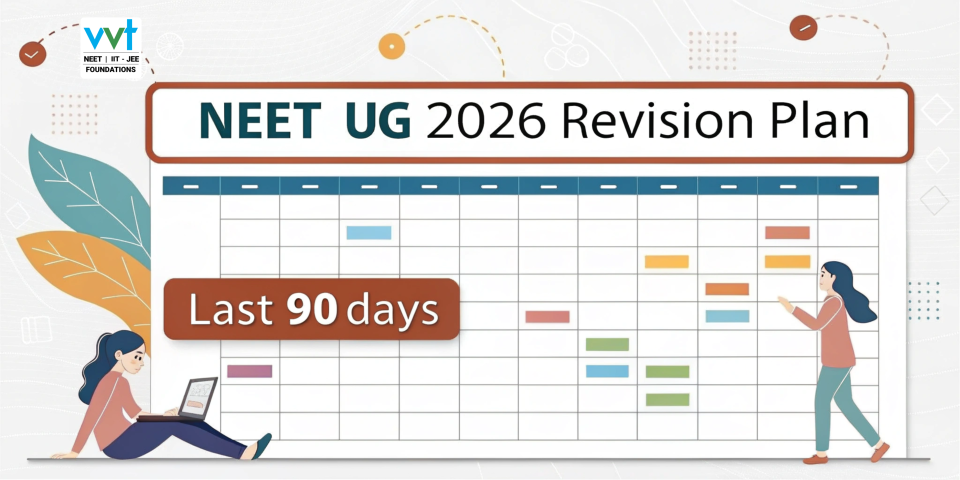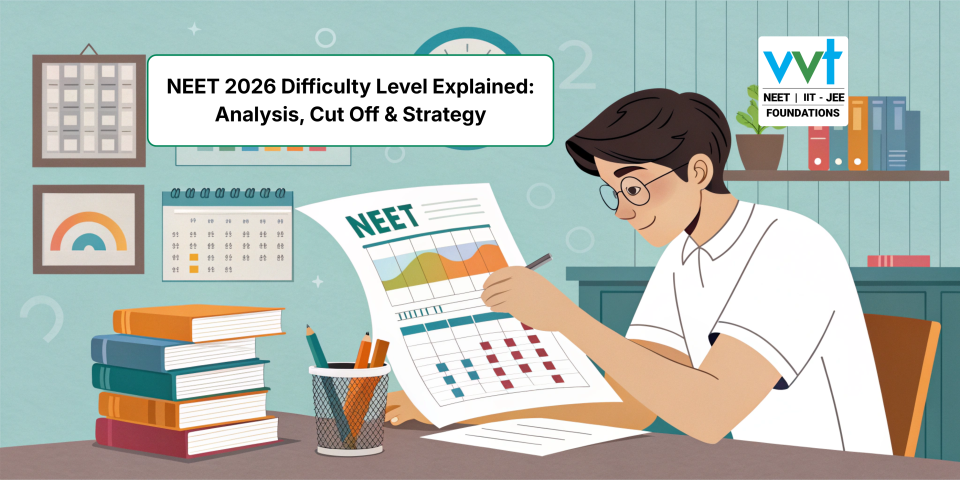
Your Path to BDS Admission Through NEET 2025: Minimum Marks, Top Colleges, and Eligibility
September 7, 2025
Top BAMS Colleges in India 2025: Your Guide to Ayurveda’s Best Institutions
September 10, 2025Why NEET Remedy Classes Matter at VVT Coaching
VVT Coaching Chennai – Ranked #1 Best NEET Coaching Centre by Times Now!
You’ve been working hard, long study hours, mock tests, notes everywhere. Yet some topics keep pulling your score down a tough organic mechanism, confusing physiology diagrams, or time consuming numericals in Physics. That’s a very common story. Instead of more general revision, what helps is focused correction, fixing the exact things that keep costing you marks.
At VVT Coaching, we don’t believe in “more of the same.” We use smart, data driven remedy classes that target your weak spots. Backed by our AI analysis and experienced faculty, this approach helped many students improve quickly and is a big reason we earned a top ranking from Times Now and a high success rate in NEET.
Here’s how it works, in simple steps.
How we’ll present the Student’s Data with In-Depth Analysis
1) Chapter-wise Breakdown
What you see: For every chapter, you’ll get a clear count of Correct / Wrong / Left questions, plus your accuracy %.
It’s like a health check for each chapter, where you’re losing marks and where you’re already strong.
Why it matters: Instead of wasting time revising everything, you know exactly which chapters need serious attention and which just need a light touch.
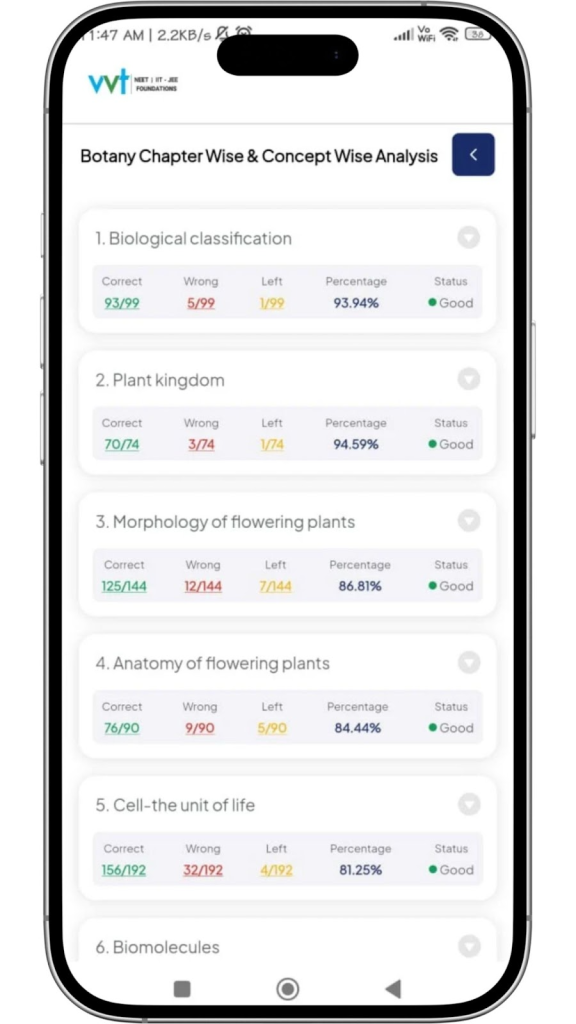
How to use it:
- Focus first on chapters with low accuracy and more mistakes.
- Book remedy sessions for your bottom 2–3 chapters.
- Keep your stronger chapters in a quick weekly revision cycle.
- After your next test, revisit this screen, if accuracy climbs, you know your fix worked.
2) Concept-wise Analysis
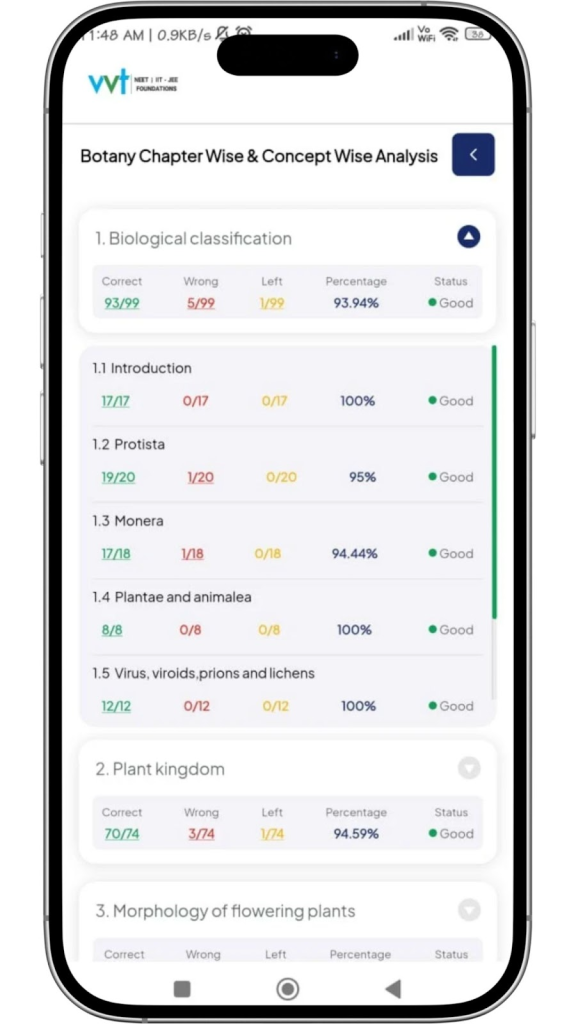
What you see: Inside each chapter, every concept is labeled as Strong, Moderate, or Weak based on your performance.
Why it matters: NEET isn’t about “big chapters”, it’ about micro concepts. Sometimes just one weak concept
costs 4–8 marks.
This view tells you where to spend that exact 60 minutes of focused effort.
How to use it:
- Strong concepts: Just keep them warm, short quizzes or flashcards.
- Moderate concepts: Add 10–15 extra questions to push accuracy up.
- Weak concepts: Remedy session and drill with teacher notes until you close the gap.
3) Question-wise Analysis

What you see: A question-by-question breakdown,Right, Wrong, Left with solutions.
Why it matters: Your total score is just the “result.” This view shows the “reason” was it a concept issue, calculation slip, misread question, or time-out?
How to use it:
- Build a Mistake Log note what went wrong and why.
- Re-solve every Wrong and Left question after reviewing solutions.
- Tag each mistake (e.g., “sign error,” “unit confusion,” “didn’t know concept”) and share with your mentor for sharper feedback.
4) Question-Type Report
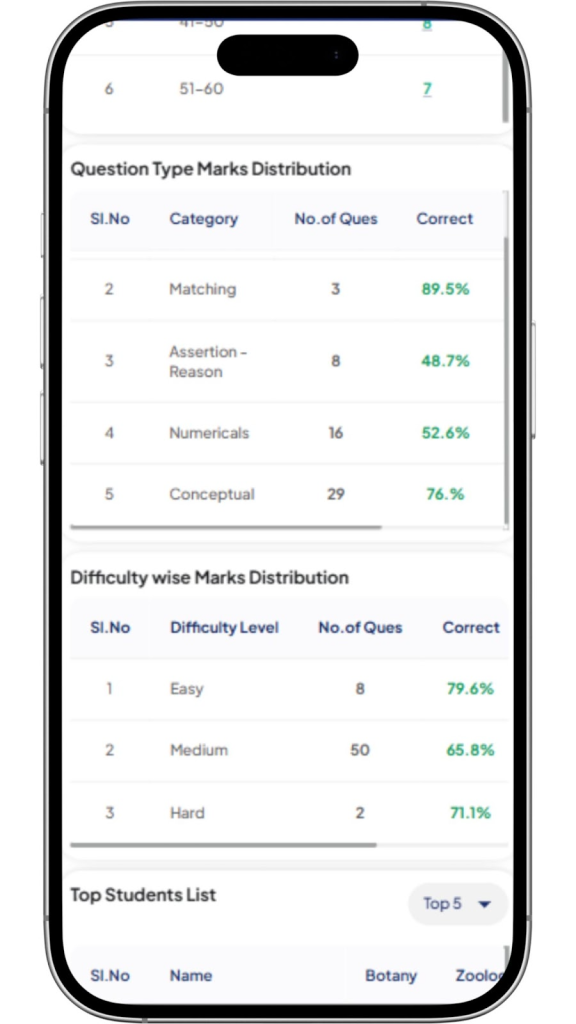
What you see: Performance split across models, Assertion–Reason, Case-based, Numerical,
Conceptual, and so on.
Why it matters: Many students know the content but lose marks in a certain format. For example, AR traps or long numerical. This report shows those patterns clearly.
How to use it:
- Spot your lowest accuracy model, it’s your next drill set.
- Ask for model-specific strategies in remedy class (e.g., AR elimination tips, case-reading cues).
- Recheck after practice, accuracy should rise and time taken should shrink.
5) Test-wise Analysis
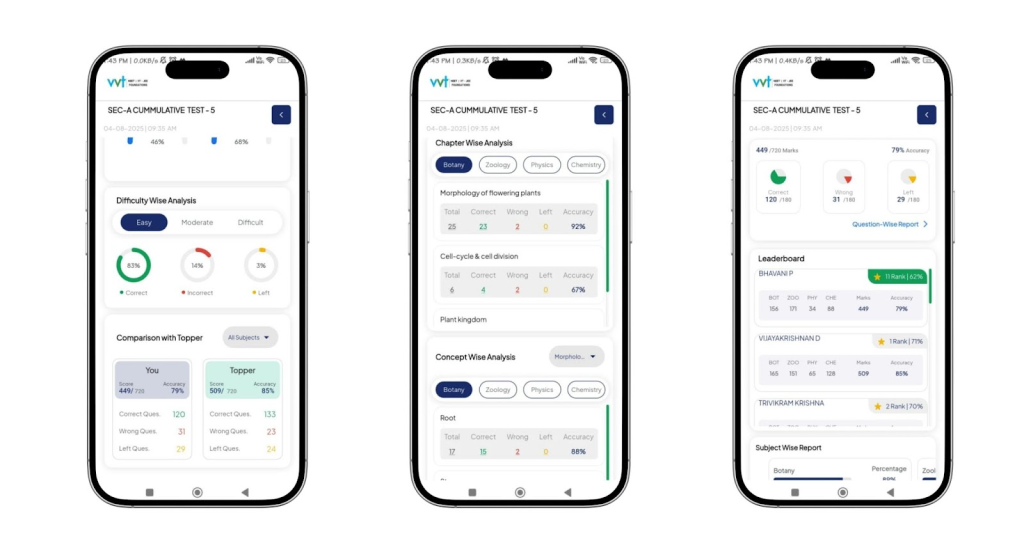
What you see: The big picture for each test, Easy/Moderate/Difficult breakdown, topper comparison, ranks, and improvement areas.
Why it matters: You’ll know why you got that score. Did you lose marks on basics? Or only on tougher edges? The topper line shows the exact gap you can still close.
How to use it:
- Low accuracy on easy = fix fundamentals fast (quick wins).
- Struggling on moderate/difficult = advanced practice + remedy needed.
- Track rank after every cycle a steady climb in accuracy means your plan is working.
6) Overall Analysis

What you see: A cross-subject view Physics, Chemistry, Biology performance, accuracy trends, and difficulty handling.
Why it matters: NEET is about balance. If one subject drags behind, it can pull down your whole rank.
This view helps you adjust weekly focus.
How to use it:
- Give more time to your weakest subject while maintaining your strongest.
- Use difficulty data to see if you need to rebuild basics or polish advanced problem types.
- Check this screen every Sunday to reset your weekly study plan.
The Old Way: Why Generic Coaching Leaves Gaps Unfilled
We’ve all seen big coaching centers with packed classrooms promising “extra help,” but it’s often just more of the same, broad reviews that don’t look closer. Why? Because spotting individual weaknesses in a sea of students is tough without the right tools. Educational research shows that without targeted intervention, students repeat mistakes, leading to scores stuck. In NEET preparation, where precision matters in 180 questions over three hours, ignoring these gaps can drop your rank by thousands.
VVT smarter approach: From Data Insights to Targeted remedy classes
Think of traditional remedy classes as a basic quick fix, helpful but not enough. At VVT, we’ve evolved it into a proactive system, powered by our AI app that analyzes your performance like a personal coach. They’re driven by reports from our AI system that show exactly which chapters, concepts and question-types you struggle with. Then experienced teachers design a compact class to fix that specific gap.
What makes these classes different:
- They’re personal: Based on your test data, not a generic plan.
- They’re short and focused: One or two high-impact sessions every 4–5 weeks.
- They’re practical: Lots of similar practice questions, tricks to avoid common errors, and timed drills.
- They measure progress: We re-test so you can see improvement.
Based on these insights, our faculty averaging 20+ years of experience designs remedy classes. These aren’t extra burdens, they’re compact sessions (1-2 hours, every 4-5 weeks) focused solely on your gaps, with visual aids, one-on-one mentoring, and follow-up tests.
For example, if the AI shows you’re acing Botany basics but fumbling applications, your remedy class might include interactive screens on diagram-based questions, led by experts like Mr. A. Subramanyamu Zoology specialist with 20+ years of experience.
Step-by-Step: How VVT Build Your Remedy Roadmap
We keep it simple and effective. Here’s how we make remedy classes happen:
- Gather the Data: From your tests (online or offline), we collect wrongs, skips, and patterns no detail slips through.
- AI Crunches the Numbers: Our platform generates reports on chapters, concepts, question types, and even difficulty levels. You’ll see topper comparisons to motivate you.
- Faculty Steps In: Experienced mentors review and tailor sessions. Small batches (up to 36) ensure it’s personal, not a lecture hall.
- Remedy in Action: Focused classes with resources like our 1.8 lakh+ question bank. Post-session, track progress in the app.
- Loop Back: Re-tests confirm fixes, adjusting your overall plan for balanced preparation.
This method is not just theory, research shows that personalized support can lift scores by 15–20%. And for repeaters, it’s even more powerful.
At our girls-only Saraswathi Campus, we’ve seen students transform what felt like a “lost year” into a winning year with focused remedy classes and mentoring.
Traditional Remedy vs. VVT Coaching Smart Remedy Classes: Spot the Difference
Not all remedy classes are created equal.
Here’s a quick side-by-side to show why VVT stands out:
| Aspect | Traditional Remedy Classes | VVT’s AI-Driven Remedy Classes |
| Basis for Sessions | General feedback or student requests | AI analysis: Chapter, concept, question-wise insights |
| Personalization | One-size-fits-most reviews | Tailored to your exact gaps, with peer/topper benchmarks |
| Frequency & Focus | Ad-hoc, broad topics | Every 4-5 weeks, laser-focused on weaknesses |
| Tools & Resources | Basic notes or extra lectures | Interactive screens, 42,000+ MCQs, real-time app tracking |
| Faculty Involvement | Group sessions | One-on-one mentoring by 20+ year experts |
| Outcome Measured | Vague improvement | Score jumps of 50-100 marks, 96.6% success rate |
Real Stories: How Remedy Classes Changed the Game
R Roshini, a 2024 repeater: “The AI showed my Physics application errors. Remedy classes with visual aids boosted me from 480 to 570 now I’m in medical college!”
Sneha Jaseja, a topper: “Concept-wise reports guided focused sessions, it clarified everything.”
These wins show across our 600+ placements, proving remedy classes solve real problems like time management and small mistakes.
These are examples of how focused correction helps, The key is practicing the right things in the right way.
Ready to Bridge Your NEET Gaps?
At VVT Coaching, remedy classes aren’t an afterthought, they’re your secret weapon, blending AI smarts with human guidance to make NEET dreams real. As 2026 approaches, don’t let gaps hold you back.
Join us at VVT coaching! or dial +91 8122122333. Let’s turn those weaknesses into your strengths.
Your medical journey starts here.
FAQs — quick answers parents and students ask
Q1: What exactly is a remedy class and how is it different from a regular class?
A: A remedy class targets your specific weak spots (found by our AI). Regular classes teach the full topic for everyone. Remedy classes are short, focused sessions with practice questions and tricks to fix the exact error patterns you keep making.
Q2: How soon will I see improvement after attending remedy classes?
A: Many students show measurable gains after 1–2 remedy cycles (about 4–8 weeks). Expect steady improvement, fewer repeat mistakes first, then better speed and more correct answers. Keep doing the follow-up practice the teacher assigns ,that’s what makes gains stick.
Q3: I always run out of time. Will these classes help improve speed?
A: Absolutely. Remedy classes include timed drills and exam strategies (question selection, time-splits, shortcut methods). After a few practice rounds you’ll learn pacing and reduce the time spent on tough question types.
Q4: Do I need to take online tests to get a remedy class?
A: No. Our system uses both offline and online test data. Whether you take tests on campus or on the app, we collect and analyze wrong/skipped answers and build the remedy plan from that data.
Q5: I’m a repeater. Are remedy classes useful for me?
A: Definitely. Repeaters usually have persistent, specific gaps.
Remedy classes target those exact gaps and convert past mistakes into mastered skills. Repeaters often see large improvements because the focus is specific, not general.
Q6: How will my parents see if this is working?
A: Our app shows progress dashboards: chapter-wise accuracy, tests improved, rank changes and teacher notes. Parents can get regular reports and attend debrief meetings with mentors to track progress and next steps.
Q7: What should I bring to a remedy class to make it useful?
A: Bring your recent test report (or just make sure your tests were taken on the VVT system), a notebook with your “mistake log,” and an open mind. Do the short homework your teacher assigns after class that practice is essential.
Q8: Can remedy classes help with exam anxiety and confidence too?
A: Yes. Confidence grows when you fix the exact problems that cost marks. Remedy classes include timed practice and small wins, teachers also share quick stress-management tips (breathing, small routines) to help on test day.


